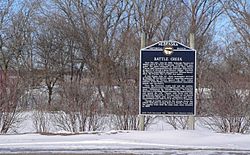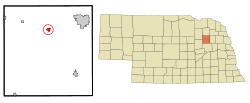Battle Creek, Nebraska facts for kids
Quick facts for kids
Battle Creek, Nebraska
|
|
|---|---|

Historical marker at northern outskirts of Battle Creek, describing the 1859 events for which the creek and the city were named
|
|

Location in Madison County and the state of Nebraska
|
|
| Country | United States |
| State | Nebraska |
| County | Madison |
| Area | |
| • Total | 0.71 sq mi (1.83 km2) |
| • Land | 0.71 sq mi (1.83 km2) |
| • Water | 0.00 sq mi (0.00 km2) |
| Elevation | 1,591 ft (485 m) |
| Population
(2020)
|
|
| • Total | 1,194 |
| • Density | 1,691.22/sq mi (653.40/km2) |
| Time zone | UTC-6 (Central (CST)) |
| • Summer (DST) | UTC-5 (CDT) |
| ZIP code |
68715
|
| Area code(s) | 402 |
| FIPS code | 31-03250 |
| GNIS feature ID | 2394082 |
Battle Creek is a small city located in Madison County, Nebraska, in the United States. It is part of the Norfolk Micropolitan Statistical Area, which means it's connected to the larger Norfolk city area. In 2020, about 1,194 people lived in Battle Creek.
Contents
A Story of Peace: How Battle Creek Got Its Name
Imagine a time in 1859 when settlers and the Pawnee people had some disagreements in the Elkhorn River valley. Soldiers from Nebraska and the U.S. Army were ready to fight a Pawnee village.
But something amazing happened! Instead of a battle, the Pawnees chose peace. Their brave leader, Chief Petalesharu, walked forward with an American flag draped over him and held a peace pipe. He faced the soldiers, asking them to stop the fight. This act of peace prevented any fighting.
Even though no battle happened, the nearby stream was named Battle Creek because of this important event. Later, in 1867, when a town was founded in the area, it took the same name as the creek.
Where is Battle Creek?
Battle Creek is located in the northern part of Madison County. A road called Nebraska Highway 121 (also known as 4th Street) goes through the western side of the city. This highway can take you north to U.S. Route 275 or south to Nebraska Highway 32.
Norfolk, the biggest city in Madison County, is about 11 miles northeast of Battle Creek. Madison, which is the county seat (where the county government is), is about 19 miles to the southeast.
The city of Battle Creek covers about 0.71 square miles (1.83 square kilometers) of land. The creek that gave the city its name, Battle Creek, flows along the western edge of the city. It then flows north to join the Elkhorn River.
People of Battle Creek
| Historical population | |||
|---|---|---|---|
| Census | Pop. | %± | |
| 1880 | 123 | — | |
| 1890 | 352 | 186.2% | |
| 1900 | 506 | 43.8% | |
| 1910 | 597 | 18.0% | |
| 1920 | 743 | 24.5% | |
| 1930 | 755 | 1.6% | |
| 1940 | 702 | −7.0% | |
| 1950 | 630 | −10.3% | |
| 1960 | 587 | −6.8% | |
| 1970 | 768 | 30.8% | |
| 1980 | 948 | 23.4% | |
| 1990 | 997 | 5.2% | |
| 2000 | 1,158 | 16.1% | |
| 2010 | 1,207 | 4.2% | |
| 2020 | 1,194 | −1.1% | |
| U.S. Decennial Census | |||
Over the years, the number of people living in Battle Creek has changed. In 1880, there were only 123 residents. The population grew steadily, reaching 1,207 people in 2010, and then was 1,194 in 2020.
A Look at the Community in 2010
According to the 2010 census, there were 1,207 people living in Battle Creek. These people lived in 457 households, and 321 of these were families.
- About 39% of households had children under 18 living with them.
- Most households (about 59%) were married couples living together.
- The average household had about 2.55 people.
- The average age of people in Battle Creek was about 39.7 years old.
- About 28% of residents were under 18 years old.
- About 17.6% of residents were 65 years or older.
- The city had slightly more females (51.8%) than males (48.2%).
See also
 In Spanish: Battle Creek (Nebraska) para niños
In Spanish: Battle Creek (Nebraska) para niños
 | Toni Morrison |
 | Barack Obama |
 | Martin Luther King Jr. |
 | Ralph Bunche |

